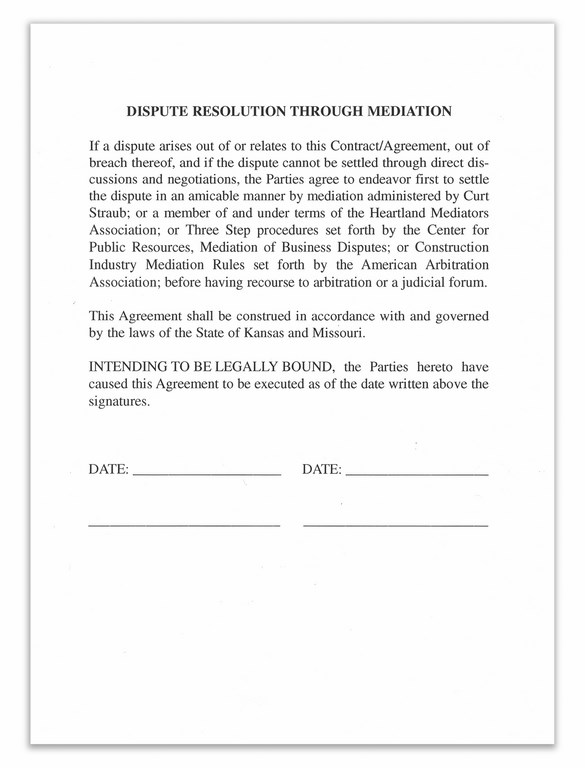Who Needs Litigation?

Most watershapers and their businesses have been (or at some point will be) exposed to some form of litigation. We do indeed live in a litigious society, and if you have yet to experience this sad reality at close hand, just wait a while: It’s the nature of the contracting business, and your turn almost certainly will come.
Doing battle in a courtroom has often been described as the world’s most expensive indoor sport, one about a half step away from hand-to-hand combat. It’s stressful, costly in time and money, incredibly distracting and generally no fun at all. In my own experience, litigation is the ultimate in misery and frustration: Even when you win, you walk away feeling like you’ve been through some kind of meat grinder.
In an effort to stave off the costly, time-consuming, unpredictable and generally unsatisfying outcomes that all-too-often arise through the conventional judicial system, many companies have been turning in recent years to Alternative Dispute Resolution. In fact, this trend has so much momentum and respect that Congress passed the Alternative Dispute Resolution Act and the President signed it into law in October 1998. This legislation mandates that all federal courts must develop and implement ADR programs.
I’m not always in support of things our government does, but in this case, I believe strongly that ADR programs and other mediation strategies can help all of us lift the burdens of litigation from our lives.
A BETTER WAY
You don’t have to have been a watershaper for very long, or, for that matter, have participated in any other construction trade, to know that lawsuits lurk around too many corners. The web of contractors suing subcontractors, homeowners suing designers and contractors and suppliers – and, generally, everyone suing everybody else – has become an unfortunate part of the industry’s fabric and psyche.
At times, it seems the lawsuit mentality is habitual, something we do reflexively and without hesitation – and I think that should stop. But how? Well, I believe it is in our individual and collective interest to do everything we can to eliminate as many legal actions as possible – and that means finding other ways to resolve our differences.
In a previous article (October 1999, page 46), I discussed the practice of partnering as a method for forming alliances among designers, engineers and contractors that can be used to streamline the work on a given project and provide a positive environment for the solving of problems as they arise. Although I firmly believe that partnering is a wonderful way to stack the decks in your favor, there is no doubt that, for all of the best intentions, there are still going to be conflicts that require outside resolution.
ADR offers a number of options in that respect, the three most common of which are negotiation, mediation and arbitration – and all of which can be used effectively before you reach the courthouse steps.
[ ] Negotiation is the most common option, one that is used daily by just about everyone in one way or another. In this (typically) informal process, parties engage in a personal, face-to-face “give and take” to resolve disputes.
 The only problem with negotiation, and one that sometimes results in unsatisfactory outcomes, is that it’s not as easy as it seems and the parties involved often do not take the time to prepare properly. (How to prepare for negotiation is a long topic unto itself – and the subject of a future article.)
The only problem with negotiation, and one that sometimes results in unsatisfactory outcomes, is that it’s not as easy as it seems and the parties involved often do not take the time to prepare properly. (How to prepare for negotiation is a long topic unto itself – and the subject of a future article.)
Suffice it to say for the moment that proper preparation means close examination of the issues at hand, with an open mind as to how and where you can bend a little for the sake of a positive outcome. In other words, it means looking in specific terms what is and isn’t important to you as well as setting aside your anger or at least holding it in check for the duration of the process.
[ ] Mediation is the process of allowing a third, neutral party to assist the disputing parties in negotiating more effectively. A neutral party is one who has no connection with the dispute or interest in its outcome. From this standpoint, the mediator helps the parties clarify relevant issues, communicate more effectively and evaluate their risks and options.
Mediation is helpful anytime negotiations get stuck. If you find yourself at loggerheads with another company or individual, the next course of action should be to suggest mediation and to seek a qualified go-between to step into the breach.
This, however, is the point at which the litigation reflex all too often kicks into gear. If you can resist the impulse at this stage and seek out a third party, you’re following the ADR path through its logical steps.
[ ] Arbitration is similar to courtroom proceedings in that the third party actually makes a decision after the parties have presented their respective positions. (We’ve all heard about arbitrators solving trade disputes, for example, or deciding how much professional athletes should be paid.)
|
Appropriate Alternatives You can tell from the accompanying text, I’m a big fan of Alternative Dispute Resolution (ADR) – although I’m not so crazy about the word alternative. I recognize that because negotiation, mediation and arbitration are all less the norm than litigation, the word fits for now. My hope, however, is that these methods will soon become so popular that they will shed the “alternative” label. When the time comes, I offer the suggestion that the initials ADR will refer to Appropriate Dispute Resolution. – C.S. |
Unlike the courts, however, arbitration is a private process and can move more quickly and be less expensive than most forms of litigation. The key is finding an arbitrator who is familiar enough with the area of conflict – and, more important, to be in agreement with the other party in the dispute that the arbitrator’s decision will indeed be binding in almost all cases.
Obviously, the first two options above are preferable in that they can reach a resolution quickly. If neither negotiation nor mediation does the job, the parties may seek other options for determining the outcome – and that doesn’t necessarily mean arbitration or litigation. Often, for example, they will step back and gather more data in order to renew negotiations or give a mediator a better shot at clearing up the issue. If an agreement is reached in this way, then it can be formalized into a written agreement and enforced under contract law.
In my view, these negotiated or mediated outcomes are preferable to arbitration, because arbitration is almost always binding (absent fraud or abuse of the process) and has no appellate procedure, as is the case in court proceedings – unless the parties have agreed up front to receive a non-binding or advisory opinion only. Even with these potential problems, however, I’d take arbitration over a date in court.
CAREFUL PACES
I want to make it clear that these processes line up in sequence. That is, if negotiations between two parties fail, mediation is the most reasonable next step for many people and firms. To me, in fact, mediation is a great alternative – and the one I’ll be dealing with for the rest of this article – because it involves an objective third party without the complication of judgment and imposition of a resolution.
Mediation allows the disputants to have a dialogue and to be highly involved with the mediator in finding a resolution. It is a process in which the parties have an opportunity to reach a shared benefit in which the solution is driven down nobody’s throat. Better still, rather than spending thousands of dollars on experts, depositions, attorney’s fees and the other “stuff” associated with preparing for trial, many mediations can be completed within hours or a few days for what is almost always a lesser cost.
For all of these potential positives, however, mediation is far from automatic. For it to work, the involved parties must be ready to push the process along.
Here are several important points to consider. As you review them, bear in mind that any of these can be a stumbling block to successful mediation and that if the answer to these questions is “no,” the first step is to try and identify whatever is necessary to satisfy these preliminary considerations before mediation begins. (In this sense, the success or failure of mediation is often determined before the disputants ever sit down with a third party.)
[ ] Are the parties ready for mediation? Is everyone involved motivated to mediate in good faith? Are the parties – and their attorneys, if they are involved – putting aside trench-warfare mentality in favor of open minds and a willingness to come to the table in search of a solution? (If one of the parties is itching for a fight, moving them toward mediation can be difficult – but even then it’s worth a try.)
[ ] Are the parties willing and able to participate directly with a mediator? Are they all willing to strive for what may necessarily be a creative solution, one that may not be immediately identifiable at the outset? Do they have enough information at hand to permit development of a sound and durable solution?
[ ] Have the parties developed their negotiation plan so that they can adequately explain their individual positions in a productive, future-oriented manner? (This is especially important and a point that is often overlooked: To mediate successfully, it’s critical that the disputants take a hard look at their specific points of conflict – the details of the situation – and identify what is most important to them in an outcome. Often this process alone leads those involved to identify possible solutions or see that the areas of conflict are more limited in scope than they may have thought initially. In other words, knowing your own desires is critical to entering the process with a pro-consensus mindset.)
[ ] Is everyone willing for this process to be confidential, or is there a need for some type of public forum for resolution? (Often, privacy – or at least confidentiality – is critical in a negotiation, especially when one of the primary considerations is the reputation of either or both of the parties. Working away from the public eye can be helpful in opening frank discussions of the situation and its possible outcomes.)
[ ] Are the parties willing to forgo a who’s right/who’s wrong approach in favor of working on mutual problem-solving and the isolation of common interests? (This is critical in that there are situations where some point of fact may never be resolved. A classic dispute in the pool industry arises, for example, over the question of whether a plaster problem has been caused by water chemistry, bad materials or improper application. No easy way out of that one!) Seeking a solution to the immediate situation can avoid the dispute becoming some kind of referendum on what may be a larger, unsolvable issue.
[ ] If attorneys are involved, are they “on board” with the mediation process? Are they supportive and willing to give advice that will help settle the dispute rather than prolong it? (In my experience, good attorneys look for solutions, while bad ones seek ways to crank up their billable hours.)
[ ] Have you found a trained mediator to do the job? (Mediators do not need to be attorneys. In fact, the most helpful mediators are often those who have been trained specifically in the skills of facilitation, evaluation, communication and problem-solving and may come from any profession. As long as both parties are confident in their selection of a mediator, the process has a very good chance of success.)
[ ] When you’ve found a mediator, have you been specific about what you want this person to do? (Define what will happen during the mediation so that you are prepared and can go in with an understanding of the process and clear expectations about procedures. Indeed, it’s a good idea to establish a schedule and a prospective time frame.)
If you’ve established a positive foundation for the process by addressing these concerns, mediation has a tremendous chance to work.
MOVING AHEAD
It seems clear that mediation is coming into its own as a means of addressing disputes. Indeed, mediation has increased exponentially in the past ten years, and it’s even gaining credibility among those whose business is litigation.
Just a decade ago, less than 50% of lawyers felt that mediation could be used effectively – and then primarily in family-based disputes. More recent surveys have discovered that fully 80% of lawyers now feel that mediation can be helpful in obtaining resolution at some point in almost any dispute.
 Mediation is very much a mindset, one that requires acceptance of the idea that by giving a little and looking for a creative solution, you will gain on all fronts.
Mediation is very much a mindset, one that requires acceptance of the idea that by giving a little and looking for a creative solution, you will gain on all fronts.
Think about the lingering impression litigation leaves with clients: How likely is it that clients who either directly participate in a lawsuit or are dragged into one are going to offer referrals for the companies involved?
Now consider the impression that can arise out of a negotiated or mediated settlement: There’s a sense of cooperation, not resentment, and those involved can even take pride in having worked through a tough situation. You may even lay the basis for future work with the person or company on the other side of the issue: Through mediation, all parties show that their time, reputations and the maintenance of civility are more important than the problem at hand. In effect, you have all risen above the problem in favor of moving forward.
Obviously, there are going to be situations that are intractable and must be solved in front of a judge. That’s just reality. But negotiation and mediation (and even arbitration) not only keep you out of court: They also salvage relationships, save time, save money, let you retain your integrity, keep you on course and, most important, let you get on with your business sooner rather than later.
The best thing about alternative dispute resolution is that nobody is served legal papers – and everyone has a shot at coming out a winner. To my way of thinking, and based on my own experiences in the legal system and with ADR, anything is preferable to feeling that need to circle the wagons and start taking prisoners.
Curt Straub has been active in the pool industry since 1962, when he joined his family’s construction company as a laborer working on backyard installations in the greater Kansas City, Kan., area. In 1970, Straub moved into the front office and headed up the company’s design and sales teams, a position he held until 1990, when he founded Aquatic Consultants. A specialist in pool and spa design, he offers mediation and conflict-resolution services along with his emphasis on structural evaluation. Straub is a long-time member of the American Concrete Institute’s Kansas Chapter and is past chairman of ACI’s swimming pool committee. He is also a past board member of the Master Pools Guild.











